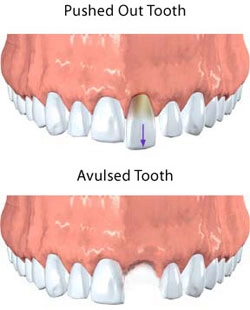Office Hours: Barton Mon-Fri: 8:00am - 5:00pm | Belconnen Mon-Fri: 8:00am - 5:00pm

Barton
8A/3 Sydney Avenue, Barton


When a tooth has been knocked out, the nerves, blood vessels and supporting tissues are damaged, too. The nerves and blood vessels can’t be repaired. But if your dentist can put the tooth back in place within 30 minutes after it was knocked out, there’s a good chance that the supporting tissues will reattach and hold the tooth in place.
In the meantime, here’s what you should do:
If you cannot get the tooth back in its socket put the tooth in a container of milk. You can also buy a kit at some pharmacies. It contains a solution similar to natural saliva. The most important thing is to keep the tooth moist.
Remember, if you act quickly and get to your dentist as soon as possible, there’s a good chance the tooth can be saved.
Putting the tooth back in place sometimes can be simple. Other times it can be complicated, such as when the tooth or bone is broken. Your dentist will use water to flush debris from the socket. Then he or she will slip the tooth back into place. The tooth will be splinted to adjacent teeth with plastic resin and orthodontic wire. This keeps the tooth stable so it can heal and reattach.
The tooth does not always reattach in the right way. If it doesn’t, it eventually may fuse to the jawbone. If this happens, the root of the tooth can erode or be reabsorbed into the body. This occurs very slowly and can take months or even years. Your dentist will monitor the tooth and may suggest further treatment, such as a root canal.
The nerves and blood vessels that were injured when the tooth was knocked out usually can’t heal. Root canal treatment often is needed to prevent the tooth from changing color or developing an abscess.
Contact us today to schedule a consultation and take the first step towards a healthy smile and functional bite.